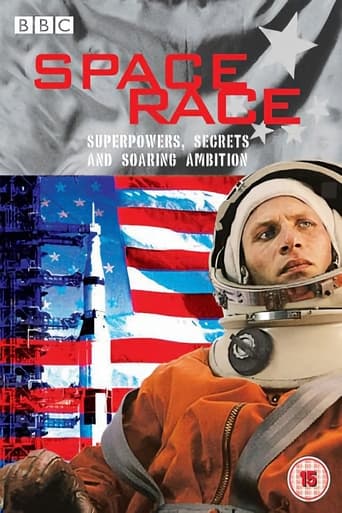selwynandrews-80958
Reasonably well-marshaled depiction of the space race. Live action nicely integrated with CGI and historical footage. Principal roles are handled well enough. But I understand there are a number of inaccuracies, and certain events are compressed or telescoped. That's kind of the problem with dramatisations. The story will often be tweaked for 'dramatic purposes', and this will add little to (or even detract from) one's understanding of what actually went on. I realise documentaries don't present the unalloyed truth, but I think I'd prefer to watch a documentary on this subject, with film of the actual events and interviews with those who were there. Aside from that, this is good enough in a potboiler-with-a-budget sort of way. One strange thing - the Russian scenes begin with the cast speaking subtitled Russian, then switch to English. It's a bit distracting, and I wonder what possessed whoever made the decision. Something else that stood out - the Russians are depicted with a lot more warmth than the Americans, who, with Von Braun, seem a square-jawed, flinty-eyed lot.
beeryusa
Firstly I should say that I saw the US version of the miniseries - apparently this version has a different narrator than the English version. Why the creators felt that was necessary is beyond me - is an English accent all that distracting for Americans? I don't think so. The 'Walking with Dinosaurs' videos have the same problem, and are virtually ruined by poor quality narration for the American versions.I liked this movie, but some things frustrated me.I think the scriptwriter made a mistake in trying to cover both the US and Soviet efforts to land a man on the moon. I think the miniseries would have been better if it had concentrated on the Soviet side of things (as the US side has been virtually done to death). The Russian parts somehow seemed deeper to me - I don't know why - perhaps it was that the personalities were more likable, or maybe the acting was just a bit more nuanced. Anyway, I felt cheated whenever the action shifted to the US.The movie is technically very good, with great special effects and good accents all around. When German is spoken it really sounds like German - none of the deeply accented German we're used to hearing with British/American productions. The Russian also seems good, although my knowledge of the Russian language is not that good.Where the movie really fails is in terms of the scope of the production: far too much is squeezed into four hours, and a great deal of important detail is lost. We get about five minutes covering Yuri Gagarin's flight, and less for Alexei Leonov's first space walk. Valentina Tereshkova's flight (the first female in space) is not even mentioned - in fact she doesn't get any mention at all - one is led to believe that all the cosmonauts were men. Similarly omitted is the Soviet lunar module. Basically the Russian side of things is basically ignored as Apollo gets off the ground. Finally, I felt the miniseries fizzled out - the US moon landing was covered very sketchily, and that was the end. I felt the film would have benefited if the Apollo-Soyuz mission was covered - that was, after all, the true end of the US-Soviet competition, and it would have ended the film on a note of hopefulness and international cooperation.
DJMonline
This 4 parter is no less than excellent. Whether a student of history, a student of the reality of space flight or if you only have a passing interest in the subject you will be gripped. It is so well put together and played that even though the events are matter of history you find yourself holding your breath with anticipation as the events unfold and asking yourself "will they, won't they" even though you may already know the answer. I would thoroughly recommend this to anyone with any interest, it's the best series of it's genere (I dare to say, better "From the Earth to the Moon" which I have enjoyed many viewings).Buy it, rent, catch it on a repeat but don't miss this outstanding piece of not just television but filmaking.
Cheerful_Dragon
This series tells the story of the space race from the point of view of the engineers who headed the USSR's and USA's rocket teams. It shows the triumphs and the tragedies without taking sides. I was delighted when Korolev, the USSR's long-unnamed 'Chief Designer', launched his first rocket, and also when Sputnik and then Gagarin made it into space. I shared Von Braun's frustration when the US military passed the satellite project to the Navy, a frustration doubled by the fact that he could have had a satellite into space a year before the Soviets.In 'The Right Stuff', the astronauts and test pilots held centre stage, and rightly so. That was their film. But however good that film was, it turned Von Braun into a caricature of a German scientist. This series tells his side of the story. It also shows the human side of the Soviet race for space and makes the viewer care about them as much as about the Americans. There is no 'us and them' in this series, just people doing something they care about. The performances are spot on and Robert Lindsay's quiet narration is perfect for giving background information and linking segments. Definitely deserves 10/10


